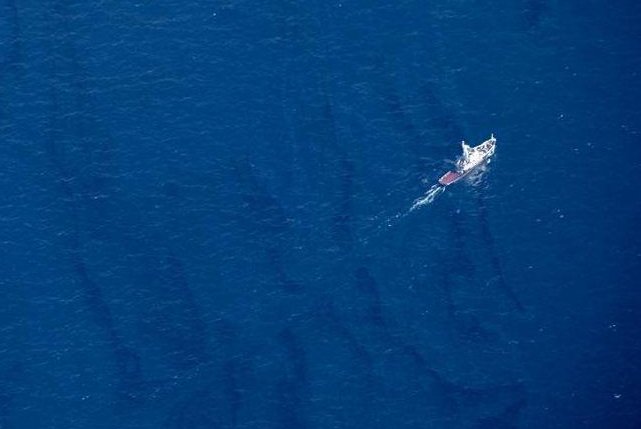Oil sheen from the site of the sinking of the Iranian oil tanker Sanchi is growing and moving north, Chinese authorities said. Photo courtesy of China's official Xinhua News Agency.
Jan. 16 (UPI) -- The oil slick spreading from the site of the sunken Iranian oil tanker Sanchi is getting bigger and moving north, Chinese maritime authorities said.
The Chinese State Oceanic Administration said that, as of Monday, the slick was about 9 miles long extending southwest from the site off the coast of China and another 11 miles east of the site. Sheen in aerial photos published in Chinese media was patchy.
The official Xinhua News Agency reported the main sheen was growing and prevailing winds and currents were pushing it north.
The Sanchi was carrying about 1 million barrels of a light form of crude oil called condensate when it crashed into a Chinese freighter on Jan. 6. Parts of the vessel exploded last week and the ship sank during the weekend.
Sanchi had been burning for more than a week before it sank Sunday, sealing the fate for the estimated 29 crew members still on board.
Officials recovered three bodies from the Sanchi -- one early last week and two others Saturday morning. The 32 crew members included 30 Iranians and two Bangladeshis.
Lu Kang, a spokesperson for the Chinese Foreign Minister, sent a message of condolence to his Iranian counterpart, Javad Zarif, for the loss of life.
"I would like to express my respect and appreciation to all rescuers for the bravery and professionalism they showed during the process," Lu added.
Chinese, Iranian and Japanese vessels were among those responding to the incident.
The official Islamic Republic News Agency reported Monday the bodies of those recovered so far were delivered to medical authorities in Shanghai during the weekend, adding there were signs that some of the crew had died because of the exposure to toxic gases.
Crews also recovered the vessel's data recorder, known commonly as a black box. Iranian President Hassan Rouhani formed a special committee to investigate the cause of the incident last week.
The worst maritime spill of this kind occurred when 2.1 million barrels of oil leaked from the Atlantic Empress off the coast of Trinidad and Tobago in 1979.















